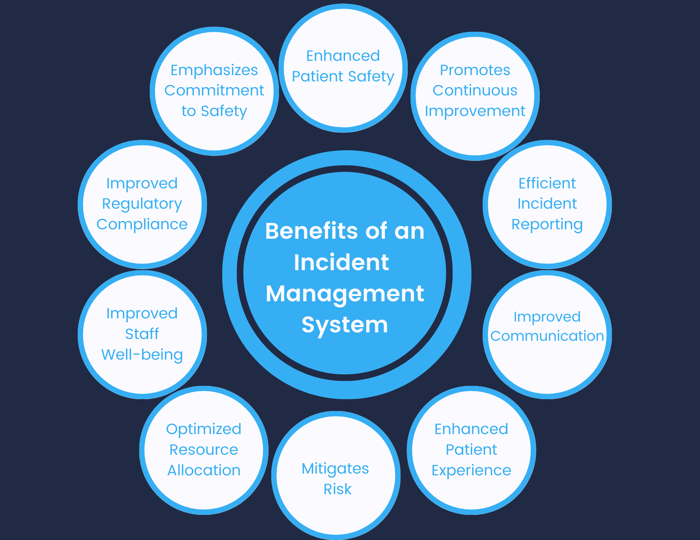2 min read
10 Benefits of an Incident Management System
Performance Health Partners
October 23, 2023

In the complex and fast-paced world of healthcare, incident management systems play a vital role in enabling healthcare organizations to manage and respond to incidents effectively. Whether it's a medical error, a patient safety concern, or a sudden system outage, healthcare providers must ensure that incidents are managed efficiently to protect patients and maintain operational excellence. In this blog post, we will explore ten key benefits of implementing an incident management system in healthcare.
What is an Incident Management System?
An incident management system is a structured and systematic approach used by healthcare organizations to identify, manage, and respond to various types of incidents and near miss events that can occur within a healthcare setting.
These incidents can range from medical errors and patient safety concerns to equipment failures, security breaches, and natural disasters. The primary goal of an incident management system in healthcare is to prevent harm and improve patient and employee safety while maintaining the continuity of healthcare services.
Benefits of an Incident Management System
- Enhanced Patient Safety: Incident management systems help identify and manage incidents and events that could threaten patient safety. According to the World Health Organization, medication errors alone cost an estimated $42 billion annually in the United States. Quick incident reporting and resolution can prevent harm and adverse events, ultimately improving patient outcomes and reducing costs.
- Promotes a Culture of Continuous Improvement: Incident management systems promote a culture of continuous improvement. By analyzing incidents and events as well as their root causes, healthcare organizations can make data-driven decisions to enhance policies, procedures, and staff training, ultimately preventing future incidents.
- Emphasizes a Commitment to Safety: Implementing an incident management software demonstrates an organization’s commitment to employee and patient safety. A culture of safety allows employees to report safety issues more freely, therefore improving the quality of care.
- Efficient Incident Reporting: A healthcare incident management system streamlines the incident reporting process, making it easier for healthcare staff to report incidents accurately and promptly. This efficiency ensures that incidents are documented and acted upon without delay.
- Improved Communication: Effective communication is crucial in healthcare. An incident reporting system provides a centralized platform for healthcare teams to share critical information, collaborate on incident resolution, and keep stakeholders informed.
According to a study researched in the Joint Commission Journal on Quality and Patient Safety, incident reports could identify specific types of communication failures that pose a significant threat to patient safety.
- Enhanced Patient Experience: Swift incident resolution and a focus on patient safety contribute to an improved patient experience. Patients are more likely to trust and return to healthcare organizations that prioritize their well-being and promptly address their concerns.
- Regulatory Compliance: Compliance with several regulatory standards, such as HIPAA, CMS, and Joint Commission, is a significant concern in healthcare. Incident management systems help healthcare organizations maintain accurate incident records, ensuring they meet reporting and documentation standards mandated by regulatory bodies.
- Improved Staff Well-Being: Healthcare professionals often experience stress when dealing with incidents, which can lead to burnout, decreased job satisfaction, and even potential errors in patient care. Incident management systems can help reduce the burden on staff by providing clear incident management protocols, support, and resources, ultimately improving staff well-being.
- Optimized Resource Allocation: Efficient incident management in healthcare allows organizations to allocate resources effectively. By prioritizing incidents based on severity and impact, facilities can ensure that the most critical issues receive immediate attention.
- Mitigates Risk: The average medical malpractice settlement in the United States is $242,000, but cases that go to trial can surpass $1,000,000. Healthcare organizations can reduce malpractice costs by mitigating risk through an incident management system. Incident reporting software cuts down on these costs by enabling organizations to take a more proactive, risk-based approach to incident management. Robust data analytics allow management to quickly identify and correct safety gaps to stay ahead of incidents and minimize risk exposure.

Ready to Get Started?
Implementing an incident management system in healthcare is crucial for maintaining patient safety, regulatory compliance, and overall operational excellence. These systems create a culture of transparency, learning, and collaboration helping healthcare organizations deliver higher-quality care while minimizing risks and improving staff and patient satisfaction.
Incident reporting software like Performance Health Partners’ can help streamline the incident management process, making it more convenient for the entire care team to play a role in improving patient and employee safety.


